- Home
- J. D. Rhoades
Won't Back Down Page 7
Won't Back Down Read online
Page 7
Tench nods. “He dropped off the radar a while back.”
“He didn’t drop off anything. Jack Keller killed him.” Waller shakes a cigarette out of the pack, puts it between his lips, and lights it. “You ever do any work for Jerico Zavalo? Cartel guy. Liked to put his opponents into a vat of acid. “
“Heard of him. Never worked for him. He was supposed to be really crazy.” Tench is looking uneasy.
“Keller did him, too. Shot the hell out of his bodyguards, then stuck Zavalo’s head in a vat of his own acid. Kept pulling him out while he was still alive to listen to him scream, then stuck his head back in until he died. At least that’s what I heard.”
Tench snorts. “You believe that bullshit?”
Waller ignores him. “Remember back in Afghanistan? Early days, when we were still in uniform? There was a contractor named DeGroot. From South Africa.”
The name makes Tench even more uncomfortable. “Interrogator. Liked to go beyond enhanced, right into slice and dice. A total bastard.” He shakes his head. “You’re telling me…”
“Keller killed him, too. You remember Danny Patrick? Mark Holley?”
Tench smiles. “Markey-D. That was one crazy son of a bitch. Whatever happened to him?”
“Dead,” Waller says. “They teamed up with DeGroot. So Keller killed them. And then he flat out murdered DeGroot while he was on his knees begging for his life.”
Tench shakes his head. “You make this Keller guy sound like he’s some kind of Terminator.”
“No,” Waller tosses his cigarette on the ground and grinds it out with the heel of his boot. “Look, I know most of this stuff is bullshit. Legend. But if a third of it is real, we’re gonna need more guys.”
“No.” Tench’s smile is pure malice. “We just need to shoot the motherfucker in the back.” He frowns. “So how did you recognize this guy anyway?”
“After Riddle got his ticket punched, the guy who hired him put out a contract. An open one. Big. Seven figures. He sent out pictures of this Keller.”
“Let me guess. No one dared to claim it.”
Waller shakes his head. “No one had time. The guy who put it out got a subpoena from a Congressional committee. He ate his own gun.”
“So no payday, no contract. Sounds like Keller got lucky.”
“Yeah.”
“Well,” Tench smiles, “we’re pretty good at making people’s luck run out.”
TWENTY-NINE
Keller slams into the house, holding the big Colt out in front of him, scanning for targets. “Alia!” he bellows. “Bassim!”
“In here,” Alia calls back. “The bedroom.”
Keller moves quickly and quietly, his weapon at the ready. He enters the bedroom. Alia is sitting on the bed, staring at something on the floor. Her hands are shaking. Keller glances down and sees a small black handgun lying on the carpet a few feet away from her. “Are you hurt?” he says. Before she can answer, he senses movement to his left and whirls, his finger on the trigger.
Bassim yelps and backs up so quickly that he smacks into the wall and knocks a picture frame down. The boy throws his hands up. “Don’t kill me! Please!” His voice is so high it’s almost a squeak.
“We’re all right,” Alia says, her voice shaking as badly as her hands. “There’s no one else here. Please put the gun down.”
Keller lowers the weapon and looks over to the gun on the floor. “So. You went and got your father’s gun. And you didn’t know what you were doing, so…” He walks over and picks up the gun. That’s when he sees the neat round hole in the door of the clothes closet. He sighs and looks at the pistol. It’s a nine-millimeter Makarov, made in Russia, used by some Iraqi army units. Probably Khoury’s service weapon.
“It was me,” Bassim speaks up. “I’m the one who did it.”
Keller looks him in the eye. “Really?”
Bassim nods, then looks away.
“No.” Alia stands up. “It was me. I got the gun out.”
Keller fights down the urge to grab the girl and shake her. “Kid,” he says in as even a voice as he can manage, “what in the hell were you thinking?”
She looks back at him with that defiant look he’s come to expect. “I was thinking there were two of them and one of you. And that if they got by you, I might have to defend my brother and myself. Do you want me to apologize for that?”
Keller stares at her, then shakes his head. “No. I don’t want you to apologize. But I do want you to tell me what’s going on. Who are those guys? Why are they watching you?”
She’s still standing, but Keller can see the tears in her eyes. “I don’t know,” she says softly. “I’ve never seen them.” She sits back down on the bed.
Keller looks at Bassim, who shrugs. “I don’t know them either. But I do know—”
“Bassim!” she snaps. “No more.”
“Ah, come on, Alia. Jack’s right. He’s trying to help us, and he’s got to know what’s going on if he’s gonna do that.” He turns back to Keller. “Truth is, we don’t really know everything. We don’t even know a lot. But we do know a couple of things.” He glances at his sister, who’s looking at the floor sullenly. “Our father was a policeman. In Iraq. Before the last war. We think he ended up doing something with your government.”
“Our government,” Alia mutters. “We’re citizens.”
“Whatever. But I think whatever he did, it pissed someone off back home.” He darts another look at Alia, but the expected admonition about language doesn’t come.
“Any idea who?”
“Terrorists,” Alia says, and looks up at Keller. “It must have been terrorists. And now they want to kill us.”
Keller frowns. He hadn’t been in the second Iraq War, only the first one. But what he’d heard from people who had been there, the pre-war government had been a snake pit, and the post-war one the same, just with different snakes. There are any number of factions that could bear grudges. But not all of them would get you Agency protection. He lets it go for the moment. “What about this guy Wilson?”
Bassim looks puzzled, then comprehension dawns on his face. “Red-haired guy? Always acts like he’s trying to sell you a car?”
As tense as he is, the description is so apt that Keller has to chuckle. “Yeah. That’s the one.”
Bassim shakes his head. “He shows up whenever Dad thinks he’s seen someone from back home.”
“And then we move,” Alia says. “To get away. And to be protected from the terrorists.”
Bassim goes over to the bed, sits down and puts a protective arm around his sister. He looks at the hole in the closet door and then back at Keller. “Look, don’t tell my dad about this, okay? The gun, I mean.”
“I’m not going to tell him,” Keller says. He looks at Alia. “You are.”
She looks alarmed. “Me?”
“Kid, when your dad finds a bullet hole in his closet door, takes out his pistol, and sees it’s been fired, what do you think is going to happen? Best thing you can do is fess up, because if he has to drag it out of you or your brother, it’s just going to be a hundred times worse. Trust me.”
“Can we?” Alia looks up. “Trust you?”
Keller nods. “Yeah, Alia. You can trust me. Both of you.”
“Then will you do me a favor?” she asks.
“Depends on what it is.”
“Stop calling me ‘kid.’”
Keller smiles. “Okay.” He looks at the clock on the bedside table. “Your dad gets home at, what? Five thirty? Six?”
“Between five thirty and six,” Alia says.
“Okay. I’ll stay here till then. And then your father and I are going to have a talk. In the meantime, you guys got homework?”
The two teenagers look at each other, then nod to Keller. “Get to work, then,” he says. Without another word, they get up and leave. Keller carries the pistol into the kitchen and sits at the table to look it over.
It’s well cared for, cleaned and oiled, and there’d apparently been a round in the chamber. Khoury had been ready for trouble, and more than just the kind posed by some schoolyard bullies. Keller’s going to find out just where that trouble was coming from.
THIRTY
“Jesus.” The smell coming off the wreck nearly makes Brock Fletcher gag as he gets out of his unmarked car. There’s the pleasant smell of charred wood underneath, overlaid by the sharp tang of burned metal. What really assaults the nose, however, is the cloying stench of roasted flesh.
“Here.” Fletcher’s partner, Lauch Cameron, tosses him a green-capped bottle of Vick’s VapoRub.
“Thanks.” Fletcher opens the bottle and rubs a little of the pungent goo under his nostrils. The fumes open his sinuses right up, but mask the worst of the smell. Fletcher puts the bottle in his pocket and approaches the wreck. The ambulance crew on the scene hangs back, not all that eager to move this particular body. Beneath the old and crumbling concrete bridge, the stream flows sluggishly.
Fletcher’s investigated a lot of wreck scenes, but he’s never seen a vehicle so totally consumed. There’s nothing left but a twisted and blackened metal skeleton, like a crude outline of a car drawn in charcoal. In the center is what’s left of the driver, a stick figure with its limbs drawn up in the familiar pugilist position, the contraction of burned muscles bringing the arms up and curling the hands into tight fists, as if the corpse had futilely tried to fight the flames with bare hands. Fletcher stops and puts his hands on his hips. “Burned hot.”
“Yep.” Cameron stands beside him and looks it over. “Pretty damn hot.”
“Too hot, maybe?”
“Maybe.” Cameron pulls on a pair of black nitrile gloves. He leans in, looking the charred corpse up and down, then takes hold of one of the window posts of the vehicle. It breaks off in his hand. He steps back to where Fletcher’s standing. “Can’t get a VIN number,” he says, referring to the unique vehicle identification number assigned to every automobile and truck. “Plate’s burned right off.”
Fletcher just grunts. At that moment, there’s a rustle in the bushes behind them and a skinny young man in a deputy’s uniform steps out. He takes stock of the two detectives standing there and swallows nervously. The nametag on the pocket of his uniform shirt reads CHILDRESS.
“You done losing your lunch back there, Childress?” Fletcher says without anger or malice. He’d lost it on his first bad call-out back in the day, a drowning who’d taken a week to wash up on the shore of the Cape Fear.
Despite the mild tone, Childress still looks like a child who’s just been slapped for spilling the syrup. “Yes, sir,” he mumbles. “Sorry, sir.”
Fletcher pulls the little bottle of Vick’s out of his pocket and passes it to the young man. “Rub some under your nose. Cuts the smell.” Childress hesitates, then unscrews the cap. He takes a little too much of the stuff, and when he rubs it on his upper lip, the pungent fumes send him into a fit of sneezing. Cameron turns away, trying to hide his laughter. When Childress seems to recover, Fletcher speaks again. “So, Deputy, what happened here?”
The young man still has tears in his eyes, and his voice is still choked, but he gets the words out. “Looks like he wasn’t paying attention. Got going too fast, ran into the bridge abutment.”
“And caught fire,” Fletcher says. “Burned the whole thing up.”
“Well, yeah. I mean, yes sir.” Childress looks back and forth between Fletcher and Cameron, as if he’s expecting a prank to be sprung.
Cameron speaks up. “Cars often burst into flames when they hit something? In real life, I mean, not the movies.”
Childress frowns. “You know, this is the first time I seen that happen.” His eyes widen. “You think maybe this wasn’t an accident? Like, maybe a bomb or something?”
“I don’t know what to think, Deputy Childress,” Fletcher says. “And you’re just now figuring out that neither do you. Am I right?”
Cameron has taken out his cell phone and is using the camera to snap photographs of the scene.
Childress nods. “Yes, sir. So, what do we do?”
“Well, you call Billy Sims at A-1 Auto Salvage. Tell him to get his flatbed out here and haul this to the impound. Tell him to be extra careful.”
Childress looks doubtful. “Garrett’s Auto Body is next in the rotation.”
“Fuck the rotation. Garrett’ll tear that thing apart getting it to impound. While you call…who, now?”
“Billy Sims,” Childress replies dutifully.
Fletcher nods. “I’ll be calling someone who owes me a favor. I want to know why that vehicle burned the way it did.”
Childress nods. “You really think this is a homicide, sir?”
Fletcher doesn’t answer right away, he just looks at the burned-up car. “Where’d you go to high school, Childress?”
Childress is clearly puzzled by the question. “West Harnett Senior High. Sir.”
Fletcher nods in approval. “You ever have Mr. Duncan for chemistry?”
“No, sir. I think he retired before I got there.”
“Too bad. He said something that’s stuck with me for a lot of years. Would you like to know what that is?”
Childress’s expression says he’s not sure if he does, but he says, “Yes, sir,” anyway.
“He used to say that most discoveries didn’t begin with someone yelling, ‘Eureka!’ They began with someone going, ‘Huh. That’s weird.’ You know what I’m saying?”
Childress still looks puzzled. Then he smiles and nods. “Yes, sir. Keep an eye out for the weird stuff.”
Fletcher nods back. “Exactly.” He motions to the ambulance crew. “This one goes to the medical examiner,” he calls out. “And try not to break him.”
THIRTY-ONE
The man Keller knows as Adnan Khoury walks through the front door at 5:47 p.m., looking like any tired dad after a hard day’s work. Keller is seated in the living room, on the couch, reading his Louis L’Amour book. Khoury’s pistol is on the coffee table in front of the couch. Khoury stops and stares for a moment, then frowns. “What is that doing here?”
“Hang on just a minute, if you would. Sir.” Keller raises his voice. “Hey, guys. Dad’s home. Come on down.”
“What is this about?” Khoury demands. “What is going on?”
Keller gives him a tight, professional smile, the smile of a non-commissioned officer politely bullying a lieutenant, or, if he’s feeling particularly bold, a captain. It’s one he hasn’t used in ages, and he’s a little surprised by how naturally it comes to him. “Just a moment, sir. We need to get everyone together.”
Khoury just stands there gawking, as shocked by the quiet assumption of command as if Keller had just grown horns. Alia and Bassim come down the stairs, with Bassim in the lead. Both look as if they’d rather be anywhere else.
“Have a seat, guys,” Keller says. He moves to one end of the couch. “You too, sir.” They comply, with Khoury taking the easy chair Keller deliberately left vacant and the children sitting on the couch closest to their father. It’s obvious that Khoury’s about to lose his temper. Keller moves quickly to maintain the leadership. “Sir. There was an incident earlier.”
Khoury’s rising irritation dissipates, replaced by fear. “What?”
“Two men. In a pickup truck. They were clearly watching the house.” He looks at Alia and Bassim. “And your children.”
Khoury looks shaken, as Keller hoped he would. “Who?”
“I don’t know, sir.” Keller deliberately lets his professional demeanor slip a notch. “I was hoping you could tell me. I think I surprised them. They pulled off.”
Khoury looks at his children, sitting on the couch, eyes down. “Bassim. Alia. Go to your rooms.”
The two turn to Keller. “With respect, sir,” he says, speaking as carefully as he can, “they have something to tell you. Before we talk.”
Khoury g
lances at them impatiently. “What, then? Out with it!” His harsh bark makes Bassim flinch, but Alia raises her eyes and thrusts out her chin in the way Keller’s getting to admire.
“I saw the men, Father. I went and got your pistol. But I didn’t know how to fire it. It went off.”
Khoury looks as if he’s been hit from behind with a brick. “What?”
“No one was hurt,” Keller says. “As you can tell.”
“There’s a hole in your closet door,” Bassim volunteers. “I think I can fix it. With some spackle, or something.”
“Be quiet, Bassim,” Khoury snaps, and Keller hates the way the boy seems to fold in on himself from the harsh words.
“I think it’s time for us to have our talk now, sir,” he says.
Alia stands up. “I’ll make dinner.” She looks at her brother. “Come on, Bassim.” The two of them exit the room. Khoury watches them go and mutters something under his breath.
Keller concentrates on the issue at hand. “So, Mr. Khoury. Why don’t you tell me the truth? For once, I mean.”
Khoury looks at him sourly. “I see you’ve dropped the ‘sir.’”
“That was for your children. I don’t want to do anything to make them disrespect you. But I need you to stop playing games with me. I need to know who’s really after you if I’m going to protect you and your family.”
“Can you describe them? These men you saw?”
“White guys. Mutt and Jeff team.” Khoury looks confused at that, so Keller fills in the reference. “One big, one smaller. Short hair. Looked military. But not completely.”
Khoury’s eyes narrow. “Contractors?”
“Yeah. That would be my guess.”
Khoury sits back in his chair, looking stricken. “That is…a new development.”
Keller leans forward, speaking in a low, intense voice, trying not to be heard in the kitchen. “Damn it. Sir. I’m trying to keep you safe. Stop being so cryptic.”

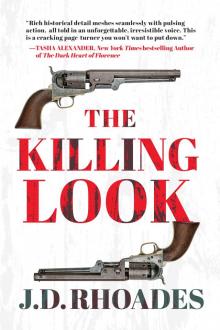 The Killing Look
The Killing Look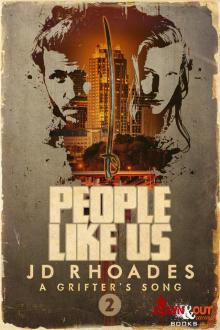 People Like Us
People Like Us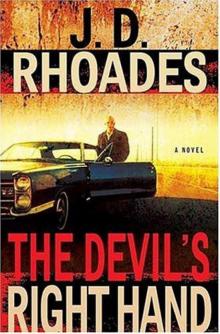 Jack Keller - 01 - The Devil's Right Hand
Jack Keller - 01 - The Devil's Right Hand Safe and Sound
Safe and Sound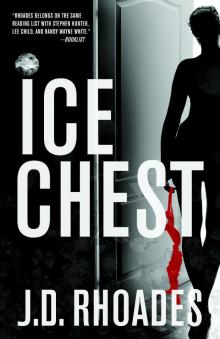 Ice Chest
Ice Chest Breaking Cover
Breaking Cover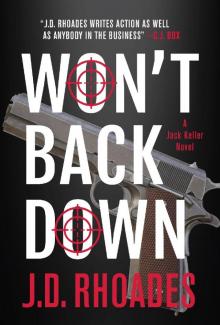 Won't Back Down
Won't Back Down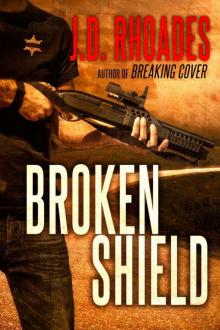 Tony Wolf/Tim Buckthorn - 02 - Broken Shield
Tony Wolf/Tim Buckthorn - 02 - Broken Shield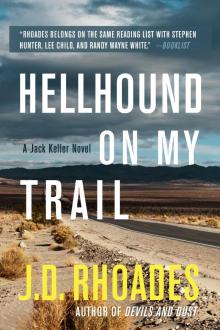 Hellhound On My Trail
Hellhound On My Trail Breaking Cover (Tony Wolf/Tim Buckthorn)
Breaking Cover (Tony Wolf/Tim Buckthorn)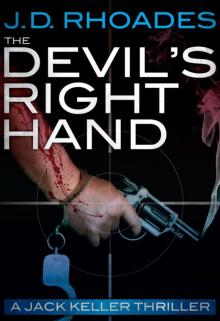 The Devil's Right Hand
The Devil's Right Hand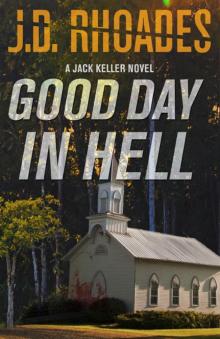 Good Day In Hell
Good Day In Hell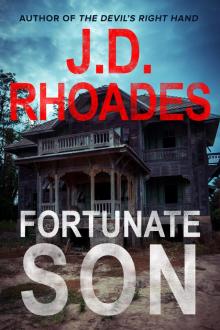 Fortunate Son
Fortunate Son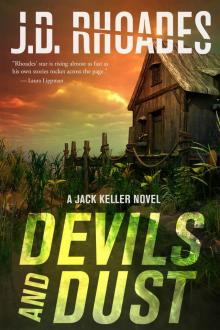 Devils and Dust
Devils and Dust